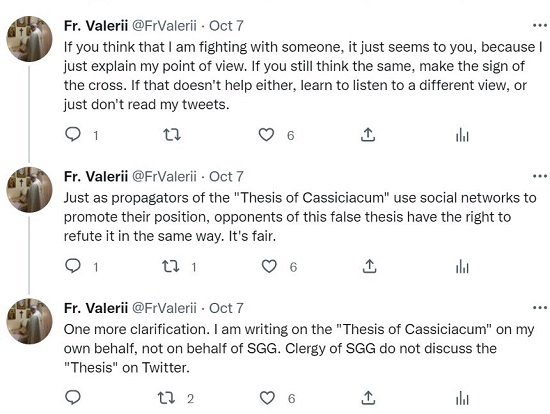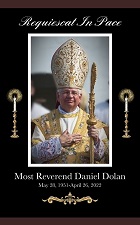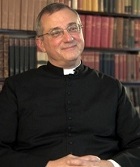"Material Pope Thesis" Twitter Debates
A few words about theological debates on the "Material Pope Thesis" (the "Thesis of Cassiciacum") in social media or social networks.
First I want to emphasize that mentioning certain proponents of the "Thesis" does not mean attacking them, and I am not conducting a "war" with them, as some wrongly say. I am simply presenting my vision of the "Thesis".
According to what I think, public debates on Twitter is neither a "fight" nor a "scandal", and I believe that the quality of discussion depends on spiritual and intellectual level of the participants, and that social media is a neutral tool, as money for example, which can be used, according to users' intentions, for good or for evil. My intention is always to use these tools only for good.
However, I can agree that Twitter debates over the "Thesis of Cassiciacum" can be described as a “nightmare” that has become a terrible reality for the proponents of the "Thesis", because they thought that only they have a privilege to use social media to promote their ideas, and that nobody has the right to criticize them publicly. So, I think that only the proponents of the "Thesis" can be "scandalized".
On October 7, I already presented my view regarding such discussions:
If you think that I am fighting with someone, it just seems to you, because I just explain my point of view. If you still think the same, make the sign of the cross. If that doesn't help either, learn to listen to a different view, or just don't read my tweets.
10:25 AM · Oct 7, 2022
Just as propagators of the "Thesis of Cassiciacum" use social networks to promote their position, opponents of this false thesis have the right to refute it in the same way. It's fair.
11:39 AM · Oct 7, 2022
One more clarification. I am writing on the "Thesis of Cassiciacum" on my own behalf, not on behalf of SGG. Clergy of SGG do not discuss the "Thesis" on Twitter.
12:03 PM · Oct 7, 2022

These Twitter debates is a public refutation of the "Thesis" which states that the "power “Vatican II popes” are capable of receiving is supplied power, which Christ directly grants to them for those acts which are absolutely necessary for the Church to continue existing and functioning." (See THE LITTLE CATECHISM ON THE THESIS, Nicolás E. Despósito, p. 5)
In other words, Fr. Desposito, one of the chief propagators of the "Thesis", says that John XIII, Paul VI, John Paul I, John Paul II, Benedict XVI and Francis received from Christ SUPPLIED POWER which is "absolutely necessary for the Church to continue existing and functioning".
Although Fr. Desposito uses the term "power" instead of "jurisdiction", it changes nothing; his goal is to form public opinion about all above mentioned persons, whom he calls "material popes'', that they are true Popes who receive power directly from Christ to assure existing and functioning of the Catholic Church.
The "Thesis" says that Legally elected by a Valid conclave a heretical "pope-elect" immediately, by acceptance of the election, becomes "material pope", occupies De Facto Legally the Throne of St. Peter and enjoys "supplied power" granted to him by Christ.
The proof that the proponents of the "Thesis" recognize the acceptance of the elections by the heretical "pope elect" is that they call him "material pope", and say "Habemus Papam materialiter Francesco".
The "Thesis" therefore, does not explain how the "material pope" is not the Pope, but how the "material pope" IS the Pope who has "supplying power" granted to him directly by Christ.
However, according to the Catholic teaching, Christ directly grants the power not to "material popes", but to ONLY true Popes immediately after they accepted the elections.
The idea that Christ grants "supplied power" to someone who is a "pope materially but not formally", as the "Thesis" says, is a new, non-Catholic idea, which actually is a modified Recognize & Resist doctrine, preached for example, by the Society of Saint Pius X (SSPX).
Returning to Twitter debates, I think that we have no right to accuse people of "lack of charity" for the fact that they are trying honestly and publicly to expose the falsehood of this anti-Catholic "Thesis". We can speak about the emotional presentation of the arguments, but not about "lack of charity" towards the proponents of the "Thesis".
On the contrary, I have to note that, unlike the proponents of the "Thesis," the behavior of the opponents was quite polite. Even when they have to respond to obvious insults, they do not violate Catholic moral basic standards. Personally, I remember only one - in a six months period - an inappropriate statement addressed to one of the chief proponents of the "Thesis."
"Lack of education"
This is not at all surprising, since the proponents of the "Thesis", who think that only they are the "formally trained", blame everyone who has courage to publicly express a slightest disagreement with the "Thesis". They even accused Bishop Dolan and Father Cekada of lack of "the philosophical and theological equipment to understand the Thesis".
The modern proponents of the "Thesis" call me, a Byzantine Rite priest, "untrained", and I can explain it as a "disease of the Latin Rite supremacy".
However, Bishop Sanborn also says that Bishop Dolan "never excelled knowledge of scholastic philosophy and sacred theology" while Father Cekada was "not a deep thinker when it came to sacred theology". And he said these words about the bishop and the priest who teached seminarians in his Most Holy Trinity Seminary for 25 years.
Let us see what Bp. Donald Sanborn wrote in Most Holy Trinity Seminary Newsletter, MAY 2022:
"To understand the Thesis requires a thorough knowledge of scholastic philosophy and sacred theology. Sorry to say, but Bishop Dolan never excelled in either of these subjects, his forte being the sacred liturgy, lives of the saints, pastoral theology, and devotions. In these subjects he excelled a great deal, far more than I. Father Cekada, as well, was a liturgy and canon law man, and a great researcher, but not a deep thinker when it came to sacred theology. Remember, I knew them both very well for nearly fifty years. This is not to criticize them, it is simply to say that I think they lacked the philosophical and theological equipment to understand the Thesis." p. 3
But what about the Most Rev. Ngo Dinh Thuc (6 October 1897 - 13 December 1984) who rejected the "Thesis" as a false idea?
He studied theology in Rome, and lectured at the Sorbonne and gained teaching qualifications before returning to Vietnam in 1927. He then became a professor at the College of Vietnamese Brothers in Hue, a professor at the Major Seminary in Hue, and Dean of the College of Providence. On 8 January 1938, Pope Pius XI created the Apostolic Vicariate of Vinh Long in Vietnam, and personally chose Fr. Thuc to be its first Vicar Apostolic. In 1957 he founded the University of Dalat. Since Most Rev. Ngo Dinh Thuc rejected the "Thesis", then Bishop Sanborn has no other choice, except to say that he "lacked the philosophical and theological equipment to understand the Thesis".
Recent public Twitter discussions demonstrated very serious problems with either knowledge or understanding of Dogmatic Theology, Canon Law, Church History and Logic on the part of the proponents of the "Thesis" themselves. Defective knowledge or understanding of these Subjects by the proponents of the "Thesis" reflects the false essense of the "Thesis" itself: There are Titles, but there are no Qualifications.
"The flames of division"
The latest division happened earlier, at least two years ago, almost immediately after death of Father Cekada, when Bishop Sanborn included the "Thesis" in the seminary courses as a subject for examination, and that was a serious reason for Bishop Dolan to recall four seminarians from the Most Holy Trinity Seminary.
Also, if you look back at the history of the "Thesis", you can see that division was caused by Bishop Guérard des Lauriers, shortly after he was consecrated by Bishop Ngo Dinh Thuc in 1981.
Fr. Guerard des Lauriers believed that the new rites of ordination and Episcopal consecration promulgated by "Paul VI" on June 18, 1968 were doubtfully valid or even totally invalid and therefore it was necessary to take action to secure a valid succession of bishops for the preservation of the Roman Catholic Church. He began discussions with Dr. Heller and Dr. Hiller, German “sedevacantist” laymen who were harboring Most. Rev. Pierre Martin Ngo Dinh Thuc. After Fr. Lauriers agreed to abate or even renounce his "thesis" and adhere to the “Sedevacantism”, it was agreed that the Bp. Thuc would consecrate him as a bishop.
On May 7, 1981, Fr. Lauriers was consecrated bishop by Bp. Ngo Dinh Thuc. However, shortly after, Bp. Guerard des Lauriers reiterated his " Cassiciacum Thesis" and started a "polemical war" with the "Sedevacantists", including Bp. Ngo Dinh Thuc.
Most Rev. Ngo Dinh Thuc did not recognize the "Thesis", and on the other hand Bp. Guerard des Lauriers returned to his "Thesis"; then it can only mean that they kept two opposite positions: Bp. Thuc - The Throne of St. Peter is Vacant, while Bp. Lauriers - The Throne of St. Peter is Occupied. It is quite clear that these two are completely different positions, and there was never unity between them.
"Agreed to disagree"
Bishop Sanborn's formula "agreed to disagree" is not about unity at all. It rather was an emphasis on an already existing division. This formula spoke only about patience on the opposite opinion and was an informal "non-aggression pact". But the pact was broken when Bishop Sanborn, without asking Bishop Dolan, inserted the "Thesis" in the seminary courses after Father Cekada's death.
Therefore, recent debates on Twitter didn't cause a new division, because division already has existed - for forty one years - from the very moment of the break of Bp. Guerard des Lauriers with Bp. Ngo Dinh Thuc in 1981.
Conclusion
As I just explained, I don't find theological debates in social media or networks to be a "fight" or a "scandal" or a "division", and I cannot say that social media or networks are bad or perfect places for theological debates.
Any social media or network, like a phone or a video connection, is a tool or a place, and there are no morally good or evil tools or places. Morally good or evil are actions, in our case words and phrases, that manifest intentions of users.
I don't think that using social media or networks, as tools or places, for theological debates necessarily means to "fight", or "scandalize" or "divide". I am sure that it is quite possible to publicly advocate one's viewpoints without insulting opponents. The quality of debates, wherever they take place, does not depend on the place itself, but on the spiritual and intellectual level of the participants.
After all, isn't the world we live in a social network? And isn't "the Kingdom of Heaven is like to a net cast into the sea"? (St. Matthew 13:47-49)
It's the priest's job to cast nets, "and gathering together of all kind of fishes", and "at the end of the world, the Angels shall go out, and shall separate the wicked from among the just."
But, if the debaters on the oposite side don't observe the elementary norms of polite behavior, constantly try to insult you, call you an "ignorants", "untrained" etc, while hiding their own incompetence behind self-proclaimed titles, trying to create an atmosphere of chaos, then outsiders may indeed have the erroneous opinion that this is not your opponents, but it is you who are incapable of conduct public debates, since most people believe a lie more easely, only because the lie comes from persons whom they know as successful and wealthy people.
Also, when it becomes clear that your opponents have failed, and for this reason they are trying to reduce debates to the level of a bazaar conflict and they twist the situation as if you are the aggressor and they are the victim, in such a case that doesn't make any sense to continue to take part in this, because this is no longer debates.
And finally, if your opponents withdrew from the debates due to lack of arguments, then it is clear that the debates are over.
Fr. V
|


